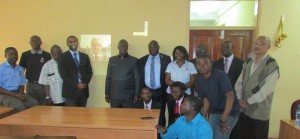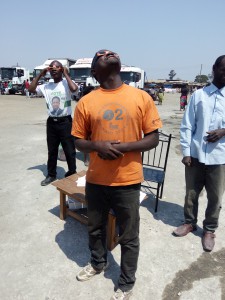Welcome to SAROAD
We are the Southern African Regional Office of Astronomy for Development.
8 August 2014, Kitwe, Zambia: The International Astronomical Union (IAU) signed an agreement with the Copperbelt University (CBU) to host a Southern African regional node of the IAU Office of Astronomy for Development (OAD). This became the second regional node to be established on the African continent after the East African Regional node a nd forms part of the IAU’s decadal strategic plan, which aims to realise the global societal benefits of astronomy. The signing follows the approval of a proposal from CBU which enjoyed the support of astronomy collaborators in Mozambique, Namibia, Zambia and South Africa, including the South African Square Kilometre Array Project Office. Find out more about us and our recent launch here.
nd forms part of the IAU’s decadal strategic plan, which aims to realise the global societal benefits of astronomy. The signing follows the approval of a proposal from CBU which enjoyed the support of astronomy collaborators in Mozambique, Namibia, Zambia and South Africa, including the South African Square Kilometre Array Project Office. Find out more about us and our recent launch here.
Updated: 29 January 2020
Southern Africa Regional Office of Astronomy for Development (SAROAD)
Host Institution – Copperbelt University
Host Country – Zambia
Countries under the office – Zambia, Botswana, Lesotho, Namibia, South
Africa, Swaziland, Zimbabwe, Mozambique, Malawi, Madagascar,
Mauritius, Angola, Seychelles, Democratic Republic of Congo, Ghana (SKA partner)
and Kenya (SKA partner).
Coordinator – Prospery Simpemba (Email: pcs200800@gmail.com)
Administrative Officer – Lenganji Mubanga Mutembo (Email:
lenganjimutembo@gmail.com)
Upcoming events:
- NASE workshop 13-16 April 2020
- Go-Lab workshop14-18 December 2020
Past events:
- Network for Astronomy School Education (NASE) workshop, 9-13 December 2019 at the University of Zambia, Zambia
- Regional AstroLab Workshop , 17-18 November 2019 at University of Venda, South Africa
- AstroLab Workshop , 30 October-4 November 2019 at National University of Science and Technology, Zimbabwe
- Regional AstroLab Workshop , 18-22 November 2018 at the University of Zululand
- Regional AstroLab Workshop , 6-11 November 2017 in
Bulawayo, Zimbabwe - AstroLab Workshop , 6-11 November 2016 at the Copperbelt University in Zambia
Website: http://southernafrica.astro4dev.org/
Countries not yet active in the region should immediately contact the
Coordinator.
————————————————————————————————————————
See the SAROAD LAUNCH in PICTURES
FEBRUARY 26, 2017: ANNULAR SOLAR ECLIPSE
We experienced an annular solar eclipse on Sunday, 26th February 2017 in the afternoon. The starting time and level of obscuration varied depending on the area. Unfortunately, most areas were cloudy and viewing was not possible except for Mwinilunga where it cleared for a few minutes.
The results of the study of the September 1 2016 and February 26, 2017 were presented at the MEARIM IV meeting in Ethiopia from 22-25 May 2017.
====================================================================================
GO-LAB Workshop
The Southern African Regional Office of Astronomy for Development (SAROAD) proposes to host
a regional workshop for teachers on global online science labs for inquiry based learning at school
from 10-14 December 2018 at CBU. Two trainers from Portugal have been funded to come and
conduct this workshop.
The Global Online Science Labs for Inquiry Learning at School (Go-Lab Project) is a European
collaborative project co-funded by the European Commission and uniting 18 organisations from
eleven countries. Go-Lab concentrates on providing access to online laboratories in order to enrich
classroom experience in schools as well as learning activities out-of-class. The overall aim of the
Go-Lab Project is to provide students an opportunity to gain hands-on experience in science by
conducting experiments using modern laboratory equipment by themselves, deepen their knowledge
in fundamental sciences, and to motivate them for taking scientific career in the future.
Go-Lab creates an infrastructure (the Go-Lab Portal) to provide access to a set of online labs from
worldwide renowned research organizations, such as European Space Agency (ESA, the
Netherlands), European Organisation for Nuclear Research (CERN, Switzerland), Núcleo Interactivo
de Astronomia (NUCLIO, Portugal), as well as multiple universities and institutions. These online
labs can be used by universities, schools, instructors, students and lifelong learners to extend regular
learning activities with scientific experiments that can be conducted not only by teachers as a
demonstration, but also by students themselves giving them real experience of scientific work.
1. In the Go-Lab Repository one can find remote and virtual laboratories for different science
domains such as Physics, Astronomy, Chemistry, Biology, Geography, and Math.
2. A teacher can use these labs together with pupils to enrich classroom activities with interactive
experiments and appealing demonstrations.
3. Go-Lab will help students with inquiry learning applications, which will support their
formulation of research questions and hypotheses, conducting scientific experiments and
drawing conclusions.
This workshop will be good for our teachers to leverage from online resources and take relief of lack
of laboratory equipment in many of our schools. There will be post workshop support from the
trainer’s organisation to keep the trainees active and to follow on the application of the acquired
skills.
We invite applications from science teachers (biology, chemistry and physics) at secondary/high school level to apply by sending the application letter to
The Regional Coordinator
Southern African Regional Office of Astronomy for Development (SAROAD)
Email: pcs200800@gmail.com
copy to: lenganjimutembo@gmail.com
The registration fee was waved.


==================================================================================
Edinburgh Medal to Kevin Govender and IAU
Held at the City Chambers and presided over by the Lord Provost of the city, Donald Wilson, the evening of Wednesday 30th March saw the 26th Edinburgh Medal ceremony, this year presented jointly to Kevin Govender, director of Office of Astronomy for Development, and Silvia Torres-Piembert, President of the International Astronomical Union.
With the oration provided by the Astronomer Royal, Lord Martin Rees, he spoke of astronomy as “a vibrant science,” and “the oldest science, except perhaps for medicine – but the first to do more good than harm.” Discussing the achievements of astronomy, space science and cosmology, he recounted human footprints on the Moon, robots on other planets in our solar system and probes landed on comets, and that “we can talk with a straight face about the first microseconds” of the universe, and described Kevin as the driving force of the OAD.
Speaking of the history and goals of the IAU, Silvia told the audience that, founded in 1919, it now has 12,407 members across seventy two countries, actively undertaking the mission of the promotion and safeguarding of the science of astronomy in all its aspects through international co-operation. With 2009 the “international year of astronomy,” it was estimated that 515 million people participated in events across 148 countries.
Discussing the goals of the IAU, she explained that “the quest to explore the universe satisfies the deepest cultural and philosophical yearnings of our species and can stimulate a sense of global citizenship,” and described how astronomy had links to mathematics, physics, chemistry, biology and drove technology and innovation.
Taking the stage, Kevin explained while astronomy was about exploring the universe, the OAD (http://southernafrica.astro4dev.org/) was about “pushing our understanding of our place in the universe,” that “it doesn’t just change a few people in the field, it changes the whole of humanity. This perspective, as enormous as it is, every one of us is capable of understanding it and every one of us is capable of changing our world.”
Having been called “South Africa’s Carl Sagan” by Lord Rees, Kevin took the audience on an animated tour through our galaxy and out beyond the local clusters to the largest structures of the universe before returning to Professor Sagan’s famous “Pale Blue Dot” photo. “We don’t need a migrant crisis to see we are all connected. We don’t need a war to drive innovation. We just need to see the Earth from space. We don’t need to have a global sea level rise and mass destruction. We need the perspective that astronomy gives us.”
Turning to the photo, projected on the back wall of the City Chambers, he invited the audience to consider our feelings were we aliens visiting this solar system, who found that blue planet, teeming with life. “Imagine the excitement. Imagine the hope.”
Speaking of the AOD’s purpose, he said that astronomy would not change the world but people would, and that their goal was to empower people to solve problems, with a focus on inclusiveness, describing the Astrosense project, producing tactile globes of the Moon to allow the visually impaired to understand the geography of other worlds, of a blind woman who analyses astronomical data converted to sound, her contribution beyond gender and disability but in the new perspective she brings to the interpretation.
Based at the South African Astronomical Observatory in Cape Town, Kevin spoke of the spirit of his home country and its desire to be at the forefront of research, with projects including the South African Large Telescope (SALT), one of the largest optical telescopes in the world, and the Square Kilometer Array (SKA), the largest capacity radio astronomy project ever conceived. “The structures are set up. Now let’s make use of them. We’re ready to roll out big ideas and big projects. May the exploration of the universe bring us closer to home.”
Closing the evening, Professor Monica Grady gave the vote of thanks, saying “There is very little in life that we get for free, but what we do get for free is a view of the night sky. You may not get the Hubble deep range, but what you will get is something which has inspired humanity for generations.”





